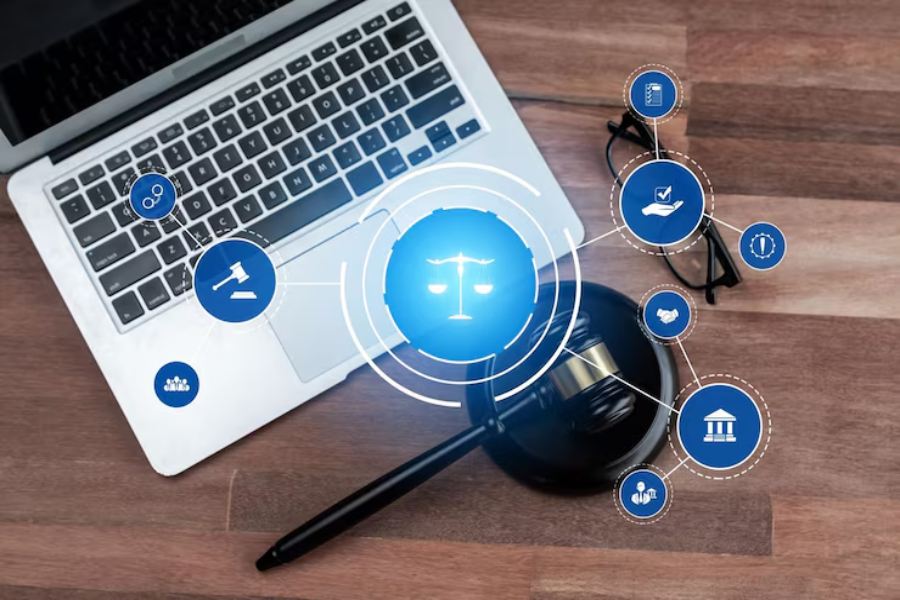Ever feel like the legal world moves at two speeds—lightning fast in the courtroom but painfully slow when it comes to paperwork? For many attorneys, juggling deadlines, research, and client demands while sifting through endless files can feel overwhelming. At the same time, clients now expect contracts they can sign on their phones, updates delivered instantly, and confidence that their information is secure.
Technology is stepping in to close this gap. Reports show that 82% of lawyers believe generative AI can be applied to their work. This shift signals that digital tools are no longer optional but essential. In this article, we will explore how modern platforms are reshaping legal practice by improving efficiency, safeguarding sensitive records, and creating better client experiences across the industry.
Digital Case Management Systems
Cases often involve heavy records, contracts, and correspondence. Traditionally, this meant endless paper files and slow retrieval. Digital case management systems now allow lawyers to organize everything securely in one place. They track deadlines, manage communication, and even automate reminders. This reduces errors and ensures clients get timely updates.
The American Bar Association found that lawyers using practice management software save an average of 8.6 hours per week. For firms handling multiple matters, these tools boost collaboration and cut duplication. Adopting them lets professionals spend more time on advocacy, while routine admin tasks run smoothly in the background. Such systems are now a necessity for every legal practice.
Secure Document Handling
Handling sensitive documents has always been a challenge for law firms. Misplacing a file or losing track of access can compromise confidentiality. Technology offers secure digital storage solutions with features like encryption, controlled sharing, and audit trails. These tools help legal professionals safeguard client information and ensure compliance with regulations.
Alongside secure storage, firms also face the challenge of working with password-protected PDF files. Case materials are often locked for security reasons but may still need to be shared with authorized colleagues. Online resources can guide professionals on how to remove password from PDF securely, ensuring files remain usable without compromising client privacy. With the right approach, firms can manage sensitive records while maintaining the highest standards of confidentiality and compliance.
Legal Research and AI Assistance
Research is one of the most time-consuming parts of the profession. Lawyers must scan through statutes, precedents, and court opinions to build solid arguments. AI-powered research platforms simplify this by quickly analyzing vast databases and presenting relevant insights. They don’t replace human expertise but provide a valuable head start.
Gartner predicts that by 2026, 50% of corporate legal departments will adopt AI tools for drafting and research. This means less time spent on routine searching and more time refining strategies. By blending human judgment with smart tools, professionals can strengthen arguments and deliver better outcomes in legal cases.
Improving Client Communication
Clear communication is the cornerstone of client satisfaction. Yet, many people feel left in the dark during ongoing matters. Secure client portals and instant messaging apps now make it possible to share updates quickly and safely. Clients can track progress, review documents, and even book meetings online. Video conferencing has also become standard, ensuring people can connect even if they cannot attend in person.
According to Clio, 79% of clients prefer working with a lawyer who offers virtual meetings. These tools build trust, reduce confusion, and help lawyers respond faster. Communication powered by technology is no longer optional; it’s a central part of modern legal service.
Mobile and Remote Work Solutions
The demand for flexibility has extended to the legal field as well. Cloud platforms let attorneys access case files, research materials, and collaboration tools from anywhere. Mobile apps further enable them to review evidence, attend hearings, and stay connected while traveling.
Key advantages include:
- 24/7 access to files, ensuring work is not tied to office hours.
- Virtual collaboration tools that allow teams to edit documents and share updates in real time.
- Lower operational costs for smaller firms by reducing reliance on large office spaces.
This responsiveness keeps client service consistent, even when unexpected issues arise. Embracing remote-friendly solutions makes practices more adaptable and ensures that clients always receive timely support.
Conclusion
Modern clients expect more than expertise; they expect efficiency, security, and accessibility. Technology helps professionals deliver on these expectations through case management systems, secure document handling, AI research, and mobile access. Each tool reduces delays and strengthens trust. By adopting these innovations, firms not only keep pace with industry change but also position themselves to exceed client expectations. The future of the legal profession lies in those willing to embrace technology and deliver service that is accurate, timely, and client-focused.


